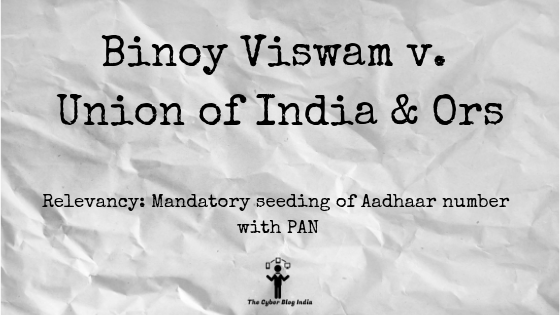Binoy Viswam v. Union of India & Ors

Binoy Viswam v. Union of India & Ors
(2017) 7 SCC 59
In the Supreme Court of India
WP (C) 247, 277, 304/2017
Before Justice Dr. AK Sikri and Justice Ashok Bhushan
Decided on June 09, 2017
Relevancy of the case: Mandatory seeding of Aadhaar number with PAN
Statutes & Provisions Involved
- The Information Technology Act, 2000 (Section 7)
- The Constitution of India, 1950 (Article 14, 21, 19(1)(g))
- The Income Tax Act, 1961 (Section 139AA)
- The Aadhaar (Targeted Delivery of Financial and Other Subsidies, Benefits, and Services), 2016 (Section 2(a), 2(c), 2(d), 2(e), 2(g), 2(h), 2(k), 2(l), 2(m), 2(n), 3, 7, 28, 29, 30)
Relevant Facts of the Case
- Section 139AA of the Income Tax Act, 1961 made it mandatory to seed Aadhaar number with PAN number for filing income tax returns.
- The provisions of this section further stated that if an assessee does not have an Aadhaar number, enrolment ID has to be provided while filing income tax returns.
- The petitioners have challenged this section on the ground that it violates Article 14, 19(1)(g), and 21 of the Constitution.
Prominent Arguments by the Advocates
- The petitioner argued that Section 139AA violates Article 14 as it discriminates against the class of assessees who did not want to voluntarily enroll for an Aadhaar card under the Aadhaar Act, 2017. In addition, they also contended that mandatorily seeding of Aadhaar card places an obligation on assessees which violates Article 19(1)(g) and also goes beyond the extent provided under Article 19(6).
- They also put forward that collection of biometric data under the Aadhar Act puts the State in an extremely dominant position in relation to an individual whereby the State can even put an individual in surveillance. Hence, mandatory seeding is violative of the right to privacy under Article 21.
- The State argued that the number of duplicate PAN cards so far is 10.52 lakhs which is more than significant to harm the nation’s economy and adversely affect the nation. The main motive of Section 139AA is to unearth black money, check money laundering, and tax evasion. Seeding of PAN with Aadhaar will prevent the use of wrong PAN for high-value transactions and it is the only robust way to de-duplicate PAN cards. Further, Aadhar will also assist law enforcement agencies in crime and terrorism. Further, linking of Aadhaar and PAN is also mandatory under international obligations such as FATCA, CRS, etc.
Opinion of the Bench
- Article 14 deals with class legislation, not with a reasonable classification for purpose of the legislation. All income tax assesses constitute one class and they are treated alike by the impugned provision.
- The court cannot question the wisdom of the legislature in enacting legislation. A law can be struck down a law if it is beyond the legislature’s competence or if it contravenes the fundamental rights and/or other provisions of the Constitution. And hence, the petitioner has to demonstrate that the Parliament has exceeded its power prescribed under the Constitution.
- A statute imposing restrictions on constitutional rights is valid if it is meant to achieve a proper purpose and if measures are taken to achieve such purpose are rationally connected with such purpose and such measures are necessary.
Final Decision
- Deletion of PAN under Section 139AA(2) for non-linking with Aadhaar number cannot be applied retrospectively to existing PAN card holders. Section 139AA(2) is read down to mean that it would be applied prospectively only. The Parliament is also given the liberty to tone down this provision.
- The obligation of an assessee to provide Aadhaar number or enrolment ID of Aadhar application form while applying for PAN or while filing an income tax return is not violative of Article 14 or Article 19(1)(g). Provisions of Section 139AA fall under the reasonable restrictions given under Article 19(6).
- The challenge under Article 14 and Article 19(1)(g) does not stand and hence, Section 139AA is held valid. Directions issued to the Central Government to consider the security of biometric records, as prescribed by Section 7 of the Information Technology Act, 2000.
- As per the challenge under Article 21, a challenge to the constitutional validity of the Aadhaar Act is already pending before a constitutional bench of the Supreme Court, and in order to maintain judicial discipline, the court would not adjudicate on this issue. The petitioner is allowed to raise his concerns in the ongoing proceedings.
इस केस के सारांश को हिंदी में पढ़ने के लिए यहाँ क्लिक करें | To read this case summary in Hindi, click here.
